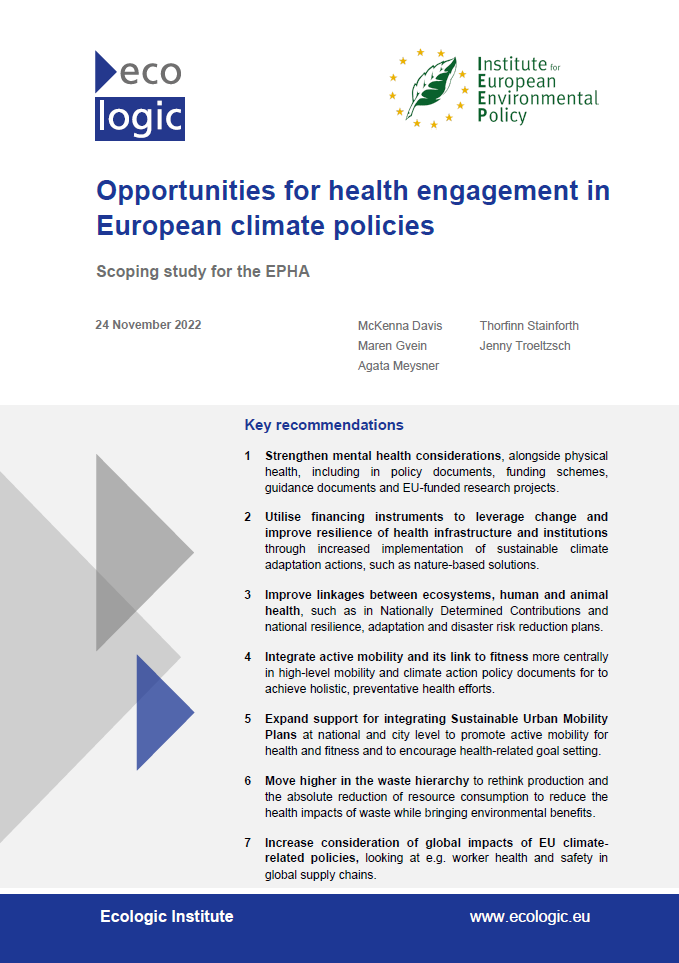Opportunities for Health Engagement in European Climate Policies
Scoping study for the EPHA
- Publication
- Citation
Davis, M; Gvein, M; Meysner, A; Stainforth, T; Troeltzsch, J (2022): Opportunities for health engagement in European climate policies: Scoping study for the EPHA. Ecologic Institute and Institute for European Environmental Policy (IEEP). Funded by the EPHA and Health Programme of the European Commission.
While climate change is established as a growing global crisis, the impact on human health and well-being are only more recently being explored. The World Health Organisation is creating momentum in this regard, with a recently issued health-driven call for climate action. However, there is a potential to strengthen the synergies between health and climate in the EU policies and measures. This paper, produced jointly by Ecologic Institute and IEEP for the European Public Health Alliance (EPHA), scopes 20 EU policy documents focused on adaptation, biodiversity, water, waste, mobility, and cross-cutting topics to analyse their treatment of health in the broader context of climate mitigation and adaptation policy. The purpose was to assess their integration of health-related concepts in order to identify gaps and opportunities, as well as provide recommendations for further advocacy for the health community.
Mental, psychosocial and physical health are in jeopardy as a consequence of both climate change related hazards (e.g. extreme heat, floods, droughts, wildfires, and hurricanes) as well as climate change-related global environmental threats (e.g. deforestation, overfishing, pollution, exposure to climate-related disasters). In this context, vulnerable and disadvantaged populations across society often face disproportionately high threats as a result of pre-existing health conditions, socioeconomic status, demographics or geographic/socio-political characteristics. There is thus an urgency for climate and wider environmental policies to recognise these interlinkages and take action to advance progress towards environmental protections to reduce potential negative impacts.
This brief responds to these needs and outlines gaps and recommendations for advocacy to improve the consideration of health-related concerns across EU policies:
- Strengthen mental health considerations, alongside physical health, including in policy documents, funding schemes, guidance documents and EU-funded research projects.
- Utilise financing instruments to leverage change and improve resilience of health infrastructure and institutions through increased implementation of sustainable climate adaptation actions, such as nature-based solutions.
- Improve linkages between ecosystems, human and animal health, such as in Nationally Determined Contributions and national resilience, adaptation and disaster risk reduction plans.
- Integrate active mobility and its link to fitness more centrally in high-level mobility and climate action policy documents to achieve holistic, preventative health efforts.
- Expand support for integrating Sustainable Urban Mobility Plans at national and city level to promote active mobility for health and fitness and to encourage health-related goal setting.
- Move higher in the waste hierarchy to rethink production and the absolute reduction of resource consumption to reduce the health impacts of waste while bringing environmental benefits.
- Increase consideration of global impacts of EU climate-related policies, looking at e.g. worker health and safety in global supply chains.





